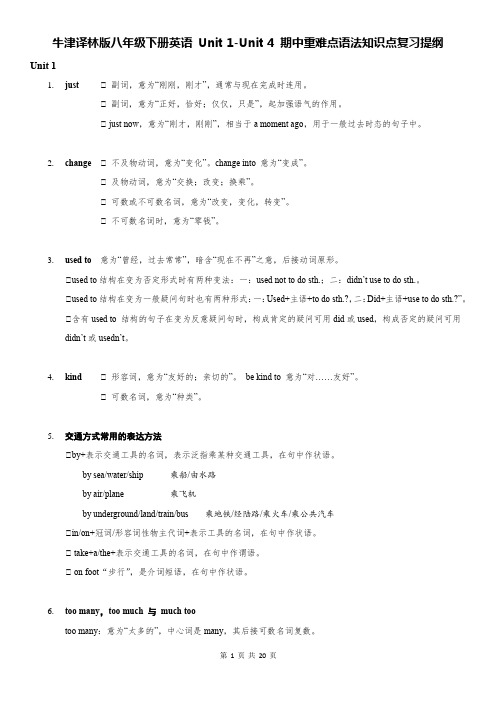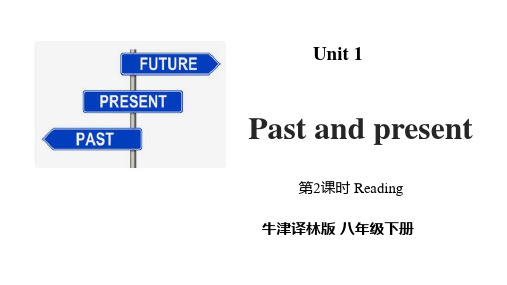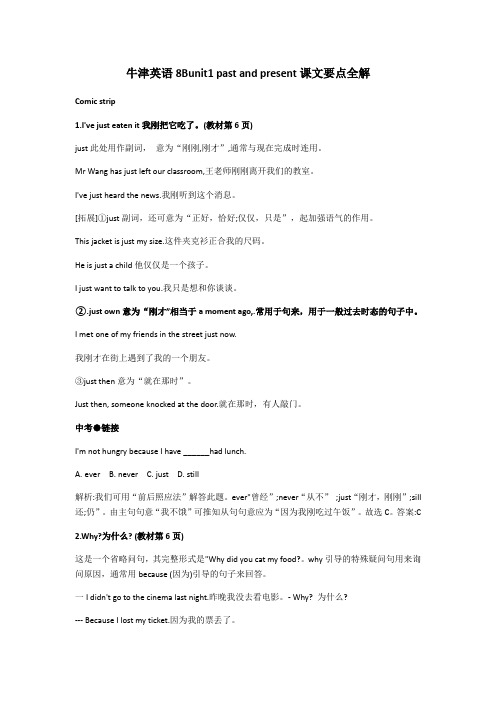译林牛津八年级下册英语 unit1 语法(共40张PPT)
牛津译林版八年级下册英语 Unit 1-Unit 4 期中重难点语法知识点复习提纲(全面!)

牛津译林版八年级下册英语Unit 1-Unit 4 期中重难点语法知识点复习提纲Unit 11.just ①副词,意为“刚刚,刚才”,通常与现在完成时连用。
① 副词,意为“正好,恰好;仅仅,只是”,起加强语气的作用。
① just now,意为“刚才,刚刚”,相当于a moment ago,用于一般过去时态的句子中。
2.change ①不及物动词,意为“变化”。
change into 意为“变成”。
① 及物动词,意为“交换;改变;换乘”。
① 可数或不可数名词,意为“改变,变化,转变”。
① 不可数名词时,意为“零钱”。
ed to意为“曾经,过去常常”,暗含“现在不再”之意,后接动词原形。
①used to结构在变为否定形式时有两种变法:一:used not to do sth.;二:didn’t use to do sth.。
①used to结构在变为一般疑问句时也有两种形式:一:Used+主语+to do sth.?,二:Did+主语+use to do sth.?”。
①含有used to 结构的句子在变为反意疑问句时,构成肯定的疑问可用did或used,构成否定的疑问可用didn’t或usedn’t。
4.kind① 形容词,意为“友好的;亲切的”。
be kind to 意为“对……友好”。
① 可数名词,意为“种类”。
5.交通方式常用的表达方法①by+表示交通工具的名词,表示泛指乘某种交通工具,在句中作状语。
by sea/water/ship乘船/由水路by air/plane乘飞机by underground/land/train/bus乘地铁/经陆路/乘火车/乘公共汽车①in/on+冠词/形容词性物主代词+表示工具的名词,在句中作状语。
① take+a/the+表示交通工具的名词,在句中作谓语。
① on foot“步行”,是介词短语,在句中作状语。
6.too many,too much 与much tootoo many:意为“太多的”,中心词是many,其后接可数名词复数。
Unit 1 第2课时 Reading 八年级英语下册(牛津译林版)

Look and Guess
feel lonely
感觉孤独的
interview with
对 ... 采访
以-leya结c尾h o的th形e容r 词:lon互el相y, lively,
frienpdllay,ylocvaerldy等s 。 打牌 play C系h动in词es+e lcohneeslys 感觉孤下独的中国象棋
b know or understand something that you did not know before
4 Now I feel a bit lonely from time to time. e not happy because of being alone a sometimes
Text
Work in pairs. Complete their conversation.
Sandy: Tell me more about your interview with Mr Chen, Millie. Has he lived in Sunshine Town all his life? Millie: Yes. He first lived with his parents in the (1) _n_o_r_th_e_r_n_ part of town, and then moved to another flat two (2) _b_lo_c_k_s_ away. Sandy: What was the town like in the past? Millie: There were some small (3) _r_e_st_a_u_r_a_n_t_s and shops.
Text
Text Analysis
英语:Unit-1.8《Speak-up》课件(译林牛津版八年级下)

buildings around him.
( d )7. I hope you will get good marks in the coming
English test.
; 人力资源培训/html/hometopfenlei/topduanqipeixun/duanqipeixun1/
I agree. 指看法, 建议
选句子应答
a. Me too. b. I agree.
c. I have the same feeling. d. The same to you.
( d ) 1. I wish you a happy weekend.
( a,c) 2. I am very surprised by the Olympic center. ( a ) 3. It takes me three hours to do the homework every
She comes to school by bus on her own.
3) What do they enjoy doing after school? They enjoy chatting.
比较: Me too. 用的范围较广( 行为, 感受等)
I have the same feeling, too. 只指感受
Listen and answer the following questions: 1) How did Millie go to school when she was in primary school? Her mother took her to school. . 2) How does Millie go to school now?
;
牛津译林版八年级英语下册全册词汇、句型、语法知识点及训练汇总

牛津译林版八年级英语下册Unit 1 Past and present词汇、句型、语法知识点及训练知识精讲一、必背词汇past n. 过去adj.过去的present n. 现在,目前just adv. 刚才since conj. 自……以来prep.自……以来ever adv. 曾经northern adj. 北方,北部的married adj. 已婚的,结婚的wife n.(pl. wives) 妻子block n.街区over prep. 在……期间pollution n. 污染;污染物factory n. 工厂waste n. 废料;废品realize (= realise )vt.& vi.意识到;实现improve vt.&vi. 改进,改善situation n. 形势,情况impossible adj. 不可能的before adv.以前,过去lonely adj. 孤独的,寂寞的anyway adv. 尽管,即使这样husband n. 丈夫interview n. 采访;会见yet adv. 还,仍recently adv.近来,最近environment n. 环境transport n.交通车辆,运输工具condition n. 环境,条件,状况return vi. 返回last adv.最近,上一次;最后abroad adv. 到(在)国外primary adj. 小学教育的;初级的communicate vt. &vi. 交流,交际exactly adv.(答语)正是,没错narrow adj. 狭窄的二、重点词汇1. present noun /ˈprez.ənt/1). something that you are given, without asking for it, on a special occasion, especially to showfriendship, or to say thank you(尤指表示友谊或致谢的)礼物,赠品例句:They gave me theatre tickets as a present.他们送给我戏票作为礼物。
牛津译林版八年级英语下册8Bunit1 past and present 课文要点全解

牛津英语8Bunit1 past and present课文要点全解Comic strip1.I've just eaten it我刚把它吃了。
(教材第6页)just此处用作副词,意为“刚刚,刚才”,通常与现在完成时连用。
Mr Wang has just left our classroom,王老师刚刚离开我们的教室。
I've just heard the news.我刚听到这个消息。
[拓展]①just副词,还可意为“正好,恰好;仅仅,只是”,起加强语气的作用。
This jacket is just my size.这件夹克衫正合我的尺码。
He is just a child他仅仅是一个孩子。
I just want to talk to you.我只是想和你谈谈。
②.just own意为“刚才”相当于a moment ago,.常用于句来,用于一般过去时态的句子中。
I met one of my friends in the street just now.我刚才在街上遇到了我的一个朋友。
③just then意为“就在那时”。
Just then, someone knocked at the door.就在那时,有人敲门。
中考●链接I'm not hungry because I have ______had lunch.A.everB. neverC. justD. still解析:我们可用“前后照应法”解答此题。
ever"曾经”;never“从不”;just“刚才,刚刚”;sill 还;仍”。
由主句句意“我不饿”可推知从句句意应为“因为我刚吃过午饭”。
故选C。
答案:C2.Why?为什么? (教材第6页)这是一个省略问句,其完整形式是"Why did you cat my food?。
why引导的特殊疑问句用来询问原因,通常用because (因为)引导的句子来回答。
牛津译林版八年级下册课件:8Bunit1 复习课 (共33张)

conclusion: already 已经, 常常用于肯定句
yet 仍,还 用于否定和疑问句 ever 表曾经 ,never 表从未。
填一填
1.They h_a_v_e__le_a_r_n_ed_ (learn) English for three years/ since three years ago/since 2011.
3. Tom and Mary _g_o_t_m__a_rr_ie_d_ in 1965. ( 结婚)
4. Tom _h_a_s__b_e_e_n_m__a_r_ri_e_d__to_ Mary for ten years . (和…结婚)
高频考点
used to do sth 过去常常做某事 1)我父亲过去是个老师.
from time to time
9.在镇的北部 in the northern part of town
10.采访某人 interview sb/have an interview with sb
11.把...变成
turn into
12.一生
all one's life
13.往返
return to and from
He is / gets used to riding a bike to school
every day.
going to school by bike
used to:
3.In the past ,I used to___B______ late,but now I am used to__________ early.
牛津译林版英语八年级下册Unit1第5-6课时知识总结(27张)

短暂性动词(buy, die, join, come,go ,leave, join ……)不能直接与for /since连用。要改变动词。
begin----- be on buy---- have come/arrive/reach/get to----- be in finish---- be over leave ---- be away
10. abroad adv.在(到)国外(in or to a foreign country)
了解一些高频的搭配:
go abroad for further study 出国深造
be abroad
在国外
study abroad
留学
live abroad
住在国外
travel abroad
出国旅游
例句翻译:我们的生活条件近几年提高了不少。 Our living conditions have improved a lot over the years.
情况良好(身体好) in good condition 健康不佳(身体不好) out of condition
8. return vi. 返回
简略答语
Yes, 主语+have/has.(肯定)
No, 主语+haven't/hasn't.(否定)
用 表示过去开始的动作或 法 状态已经结束,但是对
现在有影响。这种用法
一 常与already, just, yet,
ever, never, times (次数) 等连用.
现在完成时的时间副词和时间 短语: * 以already, just和yet为标志 * 以ever和never为标志 * 以动作发生的次数为标志 * 以so far(到目前为止)为标志
牛津译林版八年级英语下册Unit1课件(共56张PPT)

用所给词的适当形式填空:
1. Drinking _p_o_ll_u_t_e_d_ water does harm to one’s health so watepro_ll_u_t_i_o_n__ is really terrible. (pollute)
2. Guang dong Province is in the s_o__u_t_h_e_r_npart of China.
5.改进,改善 improve (名词) improvement
6.形势,情况 situation
7.尽管,即使这样 anyway
8.环境,条件 condition
9.到(在)国外 abroad
10.正是,没错 exactly
11.小学教育的,初级的 primary
12.丈夫 husband
13.妻子 wife
(n.) communication
用所给词的适当形式填空:
1. We can learn a lot about Yangzhou’s Past and
_p_r_e_s__e_n_t____(现在).
2. I can’t imagine how terrible the _s_i_t_u_a_t__io__n(形势) was
(复数) wives
14.环境 environment(形容词) environmental
Part1 Words
1. 北方 north (adj.) northern
2.南方 south (adj.) southern 3.结婚(vt.) marry (adj.) married
(n.)marriage 4.污染 (vt.) pollute (adj.)polluted(n.)pollution 5.采访(vt.) interview (n.) interview (n.)interviewer 6.进来,最近 (adv.) recently (adj.) recent 7.交流,交际(vt.) communicate
- 1、下载文档前请自行甄别文档内容的完整性,平台不提供额外的编辑、内容补充、找答案等附加服务。
- 2、"仅部分预览"的文档,不可在线预览部分如存在完整性等问题,可反馈申请退款(可完整预览的文档不适用该条件!)。
- 3、如文档侵犯您的权益,请联系客服反馈,我们会尽快为您处理(人工客服工作时间:9:00-18:30)。
open ---be open
close ---be closed
leave --be away
die ---be dead
join --be a member of begin ---be on
常见非延续性动词和延续性动词的转变
❖ arrive/come/go to be in
die
be dead
Exercises
❖ His father has died. (for 2 years) His father has been dead for 2 years.
❖ The football match has begun.(since9:00a.m) The football match has been on since 9:00 a.m.
have a cold get up be up
❖ get to know
know get out
❖ close be closed
wake up
be out be awake
❖ go to sleep
be asleep/ sleep
❖ become interested in
be interested in
2. When did you come here? I watched the football match on TV at
9:00.
什么时候使用现在完成时?
表示现在完成时的时间副词
一、already和yet常见于现在完成时 中,有“已经”之意。前者一般用在 肯定句中,后者用在疑问句中。yet 在否定句中有“还”之意。
有些动词不能和for, since, how long 等连用
• He has bought the book. • He has bought the book for a week. • He has had the book for a week.
She has bought the computer for two years.
Correcting
❖ 1. I have borrowed the book for 3 months. have kept
❖ 2. My bother has joined the army since he was 18.
has been in/ been a member of the army ❖ 3. Jack and Tom have lived here since 5years.
❖ become a ❖ Leave/ move
be a borrow be away / be out
keep
❖ buy
have open
be open
❖ join
be in/a member of
❖ start/begin be on finish/ end
be over
❖ catch a cold
牛津版初中英语八年级下
The dog has been dead for three days. She has been had (buy) the book for two week
这是为什么呢?
Grammar : 表示动作或状态从过去 开始一直延续到现在甚至将来
Mike borrowed the books two days ago. Mike has kept the books for two days.
Ten years has passed since she began to work.
重点句型: It is/ has been+段时间+since从句 段时间+has passed+ since从句
eg. 他死了两年了:
He died two years ago.
He has been dead for two years /since two years ago
提升与补充
含延续性动词的现在完成时的同义句转换。 She has worked for ten years. . She began to work ten years ago. . She has worked since ten years ago. . It is ten years since she began to work.
Did you see Joan just now? 你刚才看到琼了吗?
Have you heard from your family lately/recently?
你最近收到家人的来信了吗?
五、since短语或从句表示过去的动 作延续至今,since之后的时间为一点。
Mr. Smith has worked here since 1984.
have/has been a soldier
I have left Shanghai for 3 days.
been away from Shanghai
leave
have/has been away
The film has begun for 10 minutes.
been on
begin
have/has been on
“Has the bus left yet”?
“Yes. It has already left.”
(“No. It hasn’t left yet.) “汽车开走了吗?” “是的,已经开走了。” “不,还没有开走。 ”
二、 “already” 用于现在完成时的肯定句中, “yet” 用于现在完成时的否定句和疑问句中. 用“already” “yet”填空。
标志词:for +一段时间, since+过去的时间点, these years, so far, in the past/last …years
We _h_av_e_le_a_r_ne_d__ (learn) English
for three years/ since two years ago/since 2000.
I have borrowed the dictionary since 3 days ago .
kept
borrow
have/has kept
The concert has finished for half an
hour.
been over
finish
have/has been over
His dog has died for two years .
since 5 years ago/ for 5 years
❖ 4. The film has been on since I have come to the
cinema.
came
❖ 5. When has Mr. Li caught a bad cold?
did
catch
❖ 6. Ten years have passed since they got married. has
It is/ has been two years since he died.
Two years has passed since he died.
been dead
die have/has been dead
She has married for six years .
been married
marry have/has been married
切记有些动词是非延续的,在此用法中要换成 其相对应的延续性动词:
bБайду номын сангаасy ---have
borrow -- keep
三、ever和never也是现在完成时常 见的时间状语。前者意思是“曾经”, 多见于疑问句或否定句中;后者意思 是“从来没有”,表示全部否定。
“Have you ever seen the film?” “No. I have never seen it.”
“你曾经看过这部影片吗?” “没有, 从来没看 过。”
past
present
I have lived here for two years
1.都表示过去发生的事
2.现在完成时强调过去和现在的联系,不能和具 体的时间状语连用;
3.一般过去时强调过去发生的事或状态与表示过 去的具体时间连用(last, ago, yesterday, etc. )
eg.1. He had his breakfast at 6:00 He has had his breakfast.
❖ The twins have joined the army. (since they are 18years old) The twins have been soldiers/ been in the army since they are 18years old.
❖ My teacher has just left Nanjing. (for 3 days) My teacher has been away from Nanjing for 3 days
Mr. Green __ha_s_b_e_en___ (be) in
China these years.
They _h_av_e_w_r_it_te_n____(write) 15
songs so far.
The population __h_a_s _g_ro_w_n____
(grow) more slowly in the past ten years.
❖ 7. Jim has gone to Beijing for 2 years. has been in
